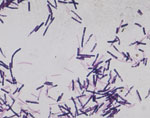Clostridium difficile detection kit
Clostridium difficile is one of the most prevalent nosocomial pathogens, mainly affecting patients after antibiotic treatment. Toxinogenic strains of C. difficile cause infections from mild diarrhoea to pseudomembranous colitis, potentially leading to death. The tissue-damaging enterotoxin (Toxin A) and the cytotoxin (Toxin B) produced by toxinogenic strains of C.difficile are responsible for the disease. Most of the algorithms used in laboratories to diagnose C.difficile described a two step methodology with a first test to identify the bacterium in order to exclude those specimens which are not positive for C.difficile from being tested with the second more expensive and time consuming test. The first line test should allow the detection of the enzyme glutamate dehydrogenase, which is specific for C. difficile, with an NPV value close to 100 %. Coris BioConcept has now developed such a C. difficile antigen detection assay, the Clostridium K-SeT, which uses specific antibodies directed against the glutamate dehydrogenase (GDH) enzyme of C. difficile. This test has been evaluated on 318 samples by a National Reference Laboratory and the following assay performances have been demonstrated: a sensitivity of 100 %, a specificity of 93 %, an NPV of 100 % and a PPV of 81,5 %.
Supplier: Coris Bioconcept
Website:



